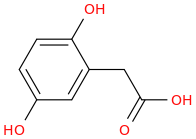Question #11ab0
1 Answer
Many of them probably do react with air.
Urine is more than 95% water.
Researchers have found at least 3079 compounds in urine. Seventy-two of these are made by bacteria; 1453 come from the body itself; 2,282 come from diet, drugs, cosmetics or the environment (some compounds belong to more than one group).
The main constituents are urea, Cl⁻, Na⁺, K⁺, creatinine and other dissolved ions and organic compounds. These include proteins, hormones, and a wide range of metabolic waste products.
I would be surprised if at least some of these didn't react when urine is exposed to air.
Perhaps the most obvious is the darkening of standing urine from persons with melanoma or certain metabolic diseases.
Their urine contains excessive amounts of homogentisic acid and melanin precursors.
Homogentisic acid

Its hydroquinone structure is readily oxidized to form coloured products.
Melanin is a brown to black skin pigment.

You can see that it has the same colour-producing backbone as acetylene black.

